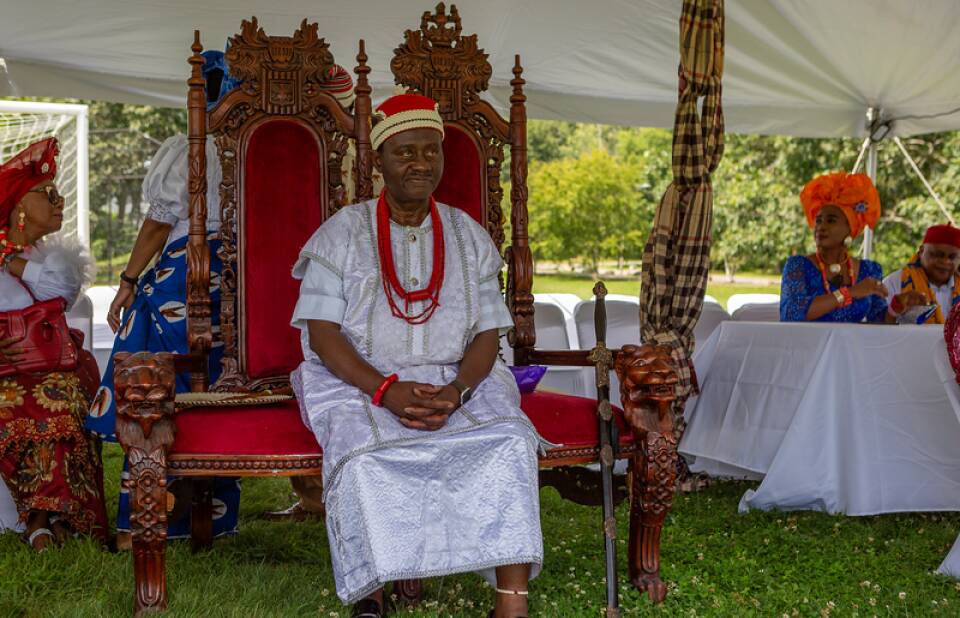Twenty-six years ago, Ejike Eze moved to Boston from Nigeria. He soon found a support system away from home among a group of immigrants who shared his background as members of the Igbo ethnic group — one of the largest in Nigeria.
The local Igbo community has grown substantially in the two and a half decades Eze has been in Boston. And the upcoming annual Igbo Day festival is how the large local community showcases and preserves its culture.
“When we first had the Igbo Day, I can’t tell the exact number of people,” said Eze, the former president of the Igbo Organization of New England. “But I can tell you that in the past 10 years, the attendance at Igbo Day has doubled.”
With those earlier events, Eze said people weren’t sure what to expect. “People would gather and do a cookout and maybe dance and go home,” he said.
But today, as more people began to show up, the event became more focused on centering Igbo culture and heritage.

Now, the festival features competitions showcasing various elements of Igbo culture, from traditional dancing to fashion and clothing for the thousands expected to attend on Saturday. The event is open to all and will be held at Belcher Park in Randolph.
Nigerian delicacies such as abacha, a cassava-based dish, and jollof rice will be served as well, Eze said.
“People are going to really have a wonderful time tasting the Nigerian cuisine,” he said. “Just talking about it makes me hungry.”
This year’s theme is “Unity in Diversity.” The Igbo Organization of New England runs the annual event, which started in 1992. The Igbo ethnic group makes up most of the the Nigerian population in Massachusetts.
Local census and population data, however, make it difficult to clearly distinguish the state’s Nigerian population by ethnic group.
The most recent data from the American Community Survey estimated more than 3,100 Igbo speakers in the state; Igbo people have a distinct language named after the ethnic group. It’s one of the largest languages in West Africa spoken by millions. The UMass Donahue Institute found 14,300 people in the state from Nigeria and 19,900 people who speak either Igbo, Yoruba, Twi or other Western African languages.
But local leaders estimate that the Igbo population in Massachusetts is closer to 50,000.
“The thing about the Igbo people is: wherever we go, we take our culture with us,” Eze said.
Angel Chizea, a 24-year-old in the local Igbo community, will be performing a traditional Igbo dance and doing face paintings during the event.
She said that being able to put her culture on display is a privilege.
“It’s so important for us to keep the culture alive, pass it down to our children’s children, make sure that everyone is learning how to speak Igbo, make sure everyone [knows] the dishes, making sure that the culture stays in touch,” Chizea said.

Chuba Bon Chibueze, current president of the Igbo Organization of New England, said that for the Igbo community in diaspora, the survival of the culture rests on passing it to the next generation.
“Being proud of your identity, passing that on to the youths ... so they’ll know, even though they don’t live in Nigeria, they don’t live in Igboland, they still have that culture here,” he said. “That culture [will] imbibe some kind of discipline in them, some kind of self-identity for them.”
Similar to other immigrant communities, organizers say their members feel trepidation watching the national political landscape.
Chibueze said his group regularly speaks with its members about their rights. Despite feeling increasingly threatened due to immigration enforcement, Chibueze said the festival will not be derailed.
“Even though there’s a general fear in the community about ICE, that will not deter us from having the event,” he said. “We’re moving forward.”
The Igbo Organization is also looking to expand by adding services and resources for the local population. They have started a school to teach youth the Igbo language. There are plans to build a new community center larger than their current home in Randolph.
The annual festival is a vehicle to fundraise for these initiatives, Eze says.
“We want to make sure that the community really comes out to witness this,” Eze said. “This is something that is better seen than narrated. So I would call on everyone to come out and be a part of it.”





